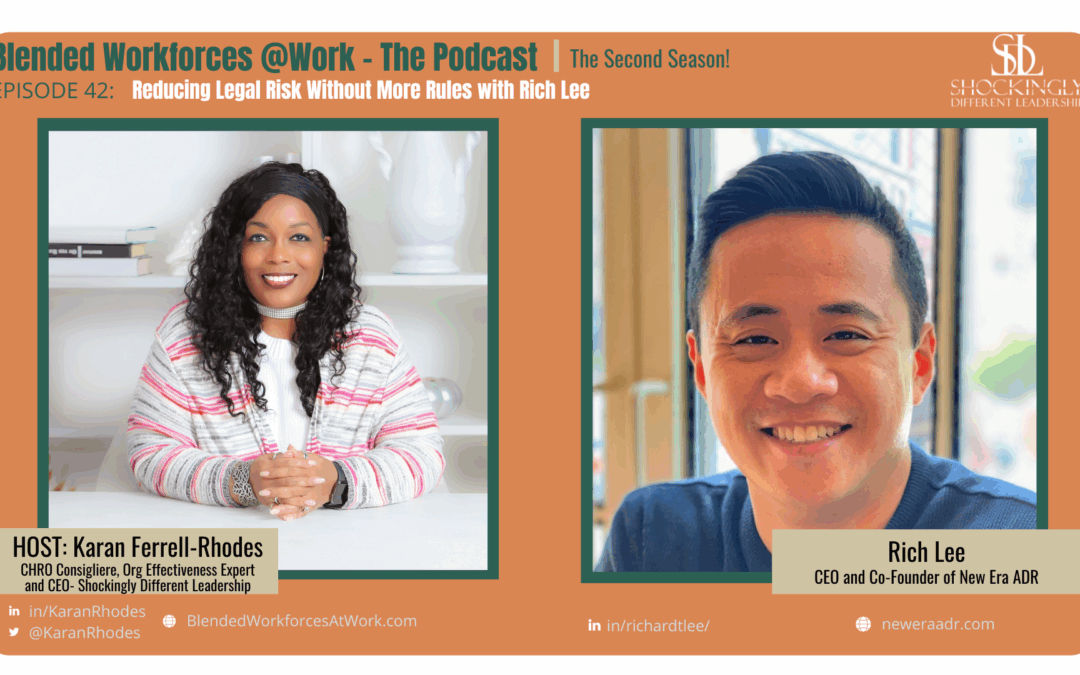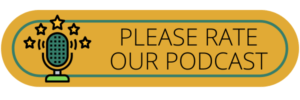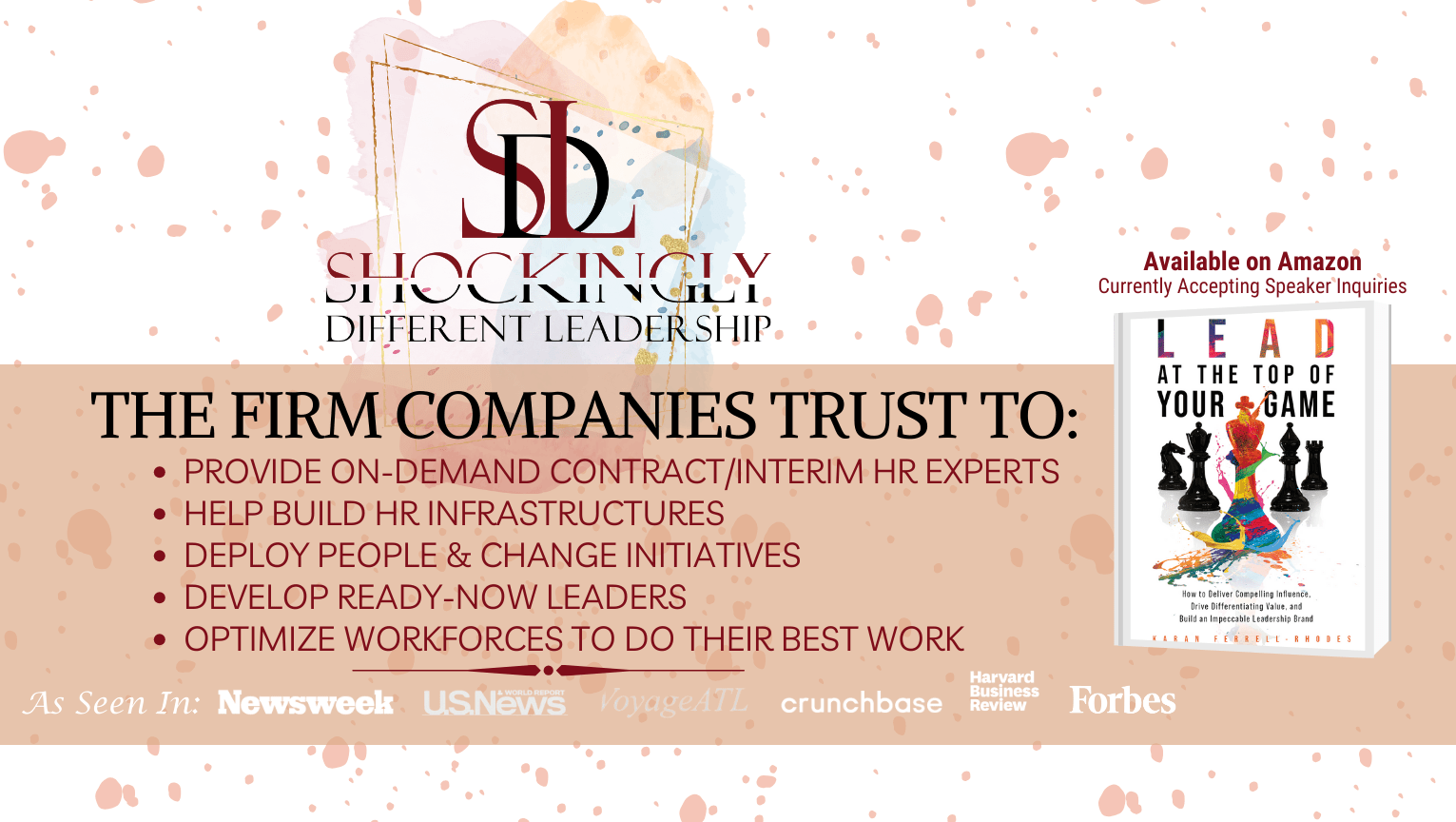IN THIS EPISODE, KARAN FERRELL-RHODES INTERVIEWS RICH LEE.
Rich explains how his company is transforming the resolution of legal disputes. He talks about how the New Era ADR platform is fair, easy to use, and doesn’t need major tech changes. He shares how companies can incorporate it into contracts and how it helps solve problems quickly while maintaining strong relationships. Rich also discusses common misconceptions about arbitration and how New Era ADR streamlines and enhances the effectiveness of legal processes.
Rich Lee is the CEO and Founder of New Era ADR. New Era ADR offers fast, online arbitration that takes only 100 days and can save up to 90% in time and cost.
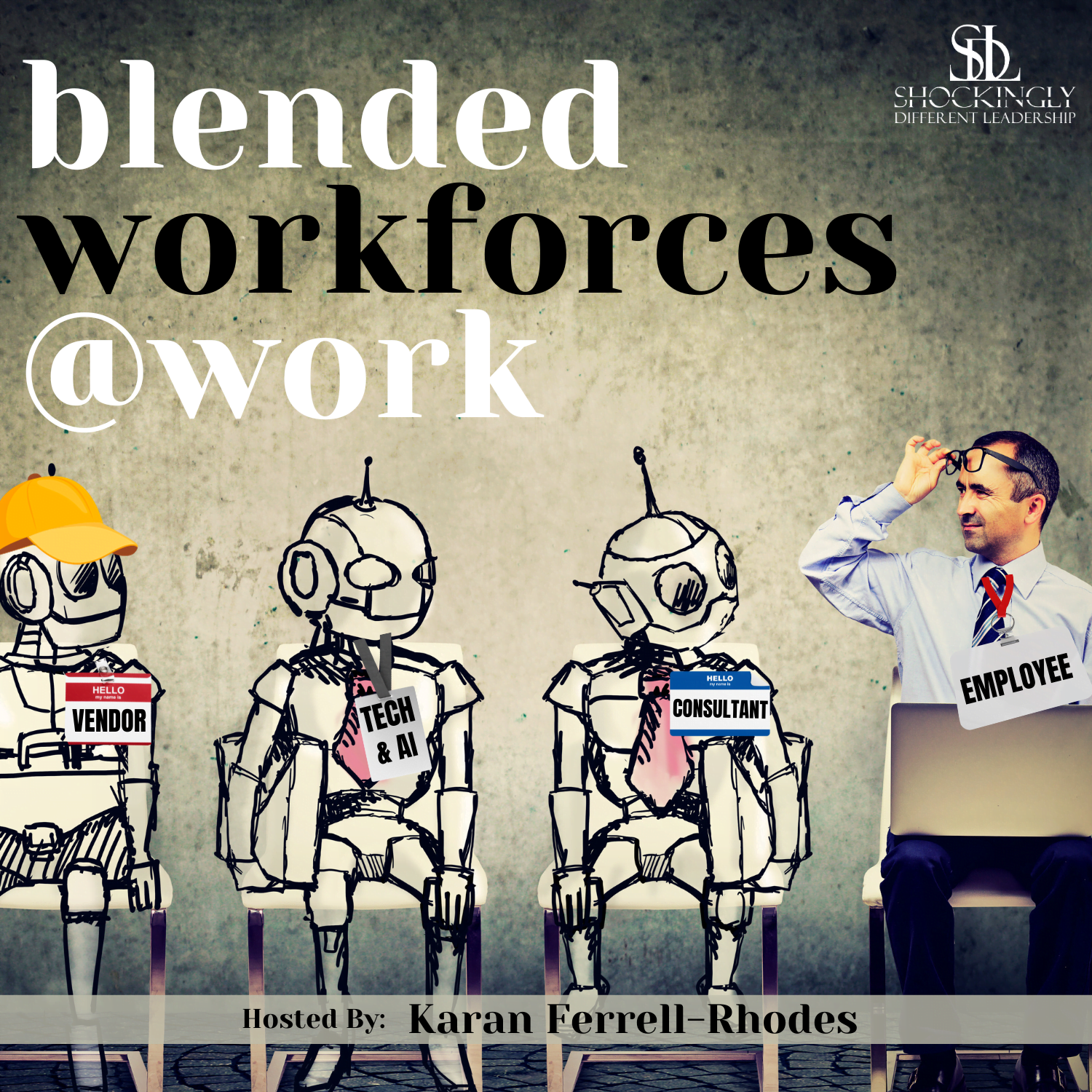
Posted by
SDL Media Team
Rather view our video podcast?

WHAT TO LISTEN FOR:
- What is the main benefit of New Era ADR’s 100-day process?
- How does New Era ADR help people stay on good terms after a dispute?
- What wrong ideas do people have about arbitration at work?
- How does New Era ADR make the process fair and easy for everyone?
- What problems with standard legal systems does New Era ADR fix?
- How does New Era ADR help lower risk for companies?
“Arbitration has traditionally gotten a bad rap.”
FEATURED TIMESTAMPS:
[02:53] Life Outside of Work
[05:36] Rich’s Career Journey
[10:37] Signature Segment: Rich’s entry into the LATTOYG Playbook: New Era ADR’s Unique Approach
[16:10] Implementation and Adoption of New Era ADR
[20:31] Challenges and Opportunities in Legal Dispute Resolution
[28:15] Signature Segment: Rich’s LATTOYG Tactics of Choice: Leading with Intrapreneurship and Courageous Agility

ABOUT RICH LEE:
Rich Lee is CEO & Founder of New Era ADR, a VC-backed technology company that saves time and money for individuals and businesses, bringing long-desired yet never-before-seen certainty and predictability to the legal dispute process, up to 90% reductions in time and cost and revolutionizing how disputes are resolved.
Rich served on executive teams of two VC-backed technology companies he helped build and scale through rapid growth and acquisition. Before that, he led market development in Asian markets for two companies.
Rich is also a board member, advisor, and investor in cutting-edge companies and with local and national nonprofits.
LINKS FOR RICH:
- Website: neweraadr.com
- LinkedIn: linkedin.com/in/richardtlee/
ADDITIONAL RESOURCES FOR YOU:


Episode Sponsor
SDL is the go-to firm companies trust when needing to:
- supplement their in-house HR teams with contract or interim HR experts
- implement leadership development programs that demonstrate an immediate ROI and impact on the business

Episode 42 | Reducing Legal Risk Without More Rules with Rich Lee
Rich Lee 00:00
For us, the biggest thing, and the thing that we were solving, what we were so frustrated by as general counsel, was, well, why do legal disputes…why do all legal disputes have to cost so much and take so much time and be such a distraction, right, when the reality is, if you actually look at the spectrum of legal disputes, there’s only a tiny percentage that really need to go to, like the court system and legacy arbitration platforms.
Karan Rhodes 00:03
Blended workforces are one of the hottest talent strategies today, where employers are using a mix of traditional employees with external resources like independent contractors, coaches, consultants, vendors, and technology solutions, all in order to enhance competitiveness, ensure cost flexibility, and expedite business goals. But how are the successful companies infusing blended workforces into their business strategy? And what are the critical success factors and pitfalls to avoid during implementation? And on the flip side, what does it really take for suppliers to improve their chances of finding and landing contract opportunities? The devil is in the details, my friends! I’m your host, Karan Ferrell Rhodes, and it’s time to get smarter about Blended Workforces at Work!Hello, my superstars. This is Karan, and welcome to another episode of the blended workforces at work podcast. We have a tremendous guest on today’s show, and I just can’t wait to delve deep and get his perspectives. But on today’s show, we do have Rich Lee, who is the co founder and CEO of New Era ADR. And New Era ADR is a VC backed technology company that is bringing more predictability to the legal dispute process with up to 90% of reductions in time and cost. Now, new era, ADR is a wonderful example of how organizations are using technology to positively impact the way they work, and I can’t wait to talk to rich about their impact on the legal profession. So welcome to the show, Rich.
Rich Lee 01:41
Thanks for having me. Karan, it’s nice to be here.
Karan Rhodes 01:43
It is so wonderful having you. We’ve had a couple with the legal professionals on the show, but they were not with technology backed companies. They were just sharing from legal risk perspectives of certain aspects of blended workforces. So I’m super excited to have a conversation with you on the show, but before we delve into it, we always love to learn just a little bit more about our guests. So for just as much as you feel comfortable, can you give us, give us a sneak peek into your life outside of work,
Rich Lee 02:15
Outside of work, reading laws and statutes. And I’m kidding,
Karan Rhodes 02:20
I was gonna say…right!? We gotta get you out more.
Rich Lee 02:26
This ends now, yeah, no, a lot of family time. I have two young kids spend as much time as I can with them. You know, they’re growing up way too fast. You know, they’re also in a whole bunch of activities, and so there’s also just required time driving them around to different sports, different activities. And now we have summer coming, so that’s going to be filled with a bunch of camps. But then for me, professionally, I also just, I love working with early stage companies, founders, startups. So like, while I’m not working on my own startup, still helping a lot of different founders, you know, at various stages, right? Operate their companies and just be a sounding board. I also invest in a lot of these early stage companies, you know, and then try to fit in tennis as much as I can. I played baseball and tennis growing up, it’s a lot harder to get a pickup baseball game with 18 other people. So tennis is, you know, always one of my go tos. And then lots of music and lots of movies,
Karan Rhodes 03:21
All right. So we have a lot in common, rich, definitely a movie fanatic. I grew up, believe it or not, a sports fanatic. I was like that cool girl that loves sports and still do so that is fantastic, and family is the best as well. So it sounds like you definitely have your priorities in order, and my husband are recently new empty nesters, so I will say they’re the light at the end of the tunnel. But time goes so quickly, so enjoy the little ones while you got them.
Rich Lee 03:51
That’s right. And actually, I should have added travel is now kind of making its way back onto the map. You know, as the kids are now, you know, a little bit older can travel well, it’s like our first international trip for them last year. Gonna go on another one this year. But yes, travel is something that’s, you know, big part of, like, my wife’s and my hobbies, yeah. So I’m with you, and I’m really excited for you and your husband, hopefully now you can go on some fun trips.
Karan Rhodes 04:18
Well, we do travel quite a bit because, you know, we do a lot of consulting as well around the world. I think we’re up to 32, 33 countries, and definitely looking for more, so our daughter has always had quite a few stamps in her passport because we’ve always brought her along on business. But I think I really commend you all, because that’s the way to open up the world to your kids while you’re you know, there and giving them guidance so that they’re good when they’re on their own. So I love that for you all,
Rich Lee 04:47
I agree. Yeah, yeah.
Karan Rhodes 04:49
Yeah. So thank you so much for sharing that piece of personal information with us. But I’d love to start delving into kind of where you are today. So can we. First start with maybe you’ve given us a few highlights or milestones of your career and what brought you to co founding a new era. ADR.
Rich Lee 05:09
Yeah, if you kind of look back at my career, I think one through line, because it’s been an unconventional legal career, like for a lawyer, a through line is definitely building. And I think I realized really early on that that’s something that I’ve always enjoyed, is building, preferably something out of nothing or something very small into something bigger. Engineer by background, was a lawyer in a law firm for one year, quickly realized this is not what I want to be doing. Join an IP investment bank, brokering a lot of technology transactions, building out an entire practice, or actually two different practices for two different organization. Organizations as part of that, right? Also leading market development in Asia, primarily in Taiwan and Hong Kong. And so literally, dropping into these markets, they had no idea who I was, who the company was, and starting from there, you know, did that, and then, you know, wanted to be closer to the technology, right? And so for me, personally, I’ve always been, you know, a first adopter of anything new in tech, anything from like the newest phones, way back when to, you know, nowadays, with AI always experimenting with new things. And so for me, wanted to be closer to the technology and not just kind of brokering a lot of these tech technology transactions. So joined two different early stage companies. Both were venture backed as well. That spanned about 11 years. One was a 13 person company. We grew that and then sold that three and a half years later. Another was a 30 person company. When I joined, you know, grew that’s over 200 plus employees, raised a lot of venture, grew the client base and the company, and they’re doing, still doing really well, right? But then that’s also where it was at that second company, which was a data science and AI company, where I met my co founders, who are also general counsel at other venture backed technology companies, as well as one of my fourth co founder was actually part of my current company and leading compliance. And so for us, it was really, I think, especially talking about blended workforces and workforces in general. This will resonate, because for us, the biggest thing, and the thing that we were solving, what we were so frustrated by as general counsel, was, Well, why do legal disputes? Why do all legal disputes have to cost so much and take so much time and be such a distraction, right, when the reality is, if you actually look at the spectrum of legal disputes, there’s only a tiny percentage that really need to go to, like the court system and legacy arbitration platforms, where, when you hear the word lawsuit, right, we just automatically assume it’s going to be a two to three year slog, hundreds of 1000s or millions in fees, Right. And that should only really be true for like, let’s say, two technology companies fighting over who owns self driving car technology, right? That should probably take years, and that’s fine. But what about employment disputes? This is with, like, whether it’s full time employees, part time employees, right? Standard, just breach of contract type disputes, right? And with a vendor or a customer or like any sort of other dispute that leads to legal potentially, you know, legal issues well, that shouldn’t require right, the same processes that are used by two giant technology companies fighting over who owns self driving car tech, right? And that’s the way the system’s set up, and that’s why, and I’m sure you know many of your listeners have been in these shoes where your company gets hit with a employment claim, and even though, after investigation, you look into it, you’re like, we did nothing wrong. Well, your next move is still to a lot of times, right? Just kind of pay the claimant some money, just because you want to avoid the two to three year SLOG and all the expense, not because you did anything wrong, correct, right? And then certainly in reverse, too, right? And part of the thesis behind nuera is, let’s just get the parties to the point right, and what’s fair is fair. And so for the same employee who’s been wronged by an organization, hey, let’s create a faster forum where they can actually stand up for themselves, right, and actually get compensation for the wrong that was actually inflicted, right? And so that’s how new era came about. And so what we are essentially, in, you know, kind of one sentence, is we are 100 day arbitrations, so just as legally enforceable as you know, the courts and legacy arbitration platforms, but we adjudicate these cases in 100 days, all for one flat fee, all online, so highly accessible, right? The same quality people hearing your cases, and so people who are knowledgeable in the subject matter, whether it’s employment, whether it’s, you know, cryptocurrency or financial institutions, so the same quality people hearing the cases, but getting parties to the point faster, and having these cases legally adjudicated in 100 days, so that the parties can kind of go back to their lives, right? Which is what we all want.
Karan Rhodes 09:52
Now, who is your client? Do you have to get both parties on board to agree to use your platform? Or does one you. Like a company hire you all and say this is our default first round to try to dispute issues or claims, and they let people know.
Rich Lee 10:11
And so you’re exactly right to agree to arbitration. Both sides have to agree where they agree, though, is typically contractual right, because by the time, like we’re not trying to go talk to people who are ready in the middle of a fight and say, hey, yeah, yeah, size are in a fight. They’re not agreeing anything new, right? And so typically, we get written into contracts. And so a lot of times it’s the companies who might write us in first, right? But then they’ll communicate it to their employees or to their customers or users, whomever, right? And say, hey, we adopted this, but we adopted a platform and a forum that’s, frankly, way more fair for you too, right? Because if we did something wrong as the company that adopted this, we also can’t play games, right? We can’t drag things out. We can’t use our considerable resources just to bury you and make it really painful for you to actually just, you know, tell us exactly what we did wrong. And so that that’s actually landed really well, right in terms of, you know, kind of the the acceptance in the industry. But it’s always, it’s contractual. And so, for instance, we’re getting written we re we’re getting written into tons of employment agreements. Yeah, employee handbooks, terms and conditions, you know, you name it. And of course, because at the end of every agreement that you’ve that you’ve ever signed, any Terms of Use you’ve ever clicked through, there’s always a clause right that nobody ever reads that says, if we have a legal dispute, we will resolve it in, you know, the courts in Atlanta, or this legacy arbitration platform, so people are crossing that out and putting in new era, ADR. And so what that means is, then any future dispute that comes up under that agreement comes to us and both parties no longer have to deal with that, the pain and the expense and, frankly, the distraction of, like, potentially two years of just fighting.
Karan Rhodes 12:02
So I’m just just helping the listeners and the lay person better understand, once an issue comes up and say, a company sends out the information, a link or whatever, how to get to your platform, is that when you all take over and ask both parties to submit information, or you start the process at that point, and you handle it separately from the company. Or I’m trying to understand how much involvement from both sides is there.
Rich Lee 12:32
So think of us as a private digital court, right? So we are the court. We are Switzerland. We are the adjudicators of like all our arbitrators and mediators are the adjudicators, so we don’t help either side, we don’t represent either side. So both sides actually kind of file an arbitration claim those same way you file a lawsuit, the other side responds. Many of our customers and our users who’ve adjudicated cases have lawyers just like they would have in court, but also we’ve deliberately built this to be highly accessible to people who are not represented by lawyers, and still make it easy enough to understand that they can kind of go through this process themselves. So we’ve had a number of cases where people you know don’t have lawyers, but usually what happens is the link to our where you would file the case on our platform is written right into the employment agreement or the terms of use. And so the way it would work is, God forbid, something comes up and there’s a disagreement, whichever side decides that they want to initiate kind of the arbitration, they would just go to the website, create an account, file the case, just like you would with a lawsuit, and then the other side would get a notice, and they would respond, and then the whole process would get going. Eventually an arbitrator will get assigned, just like a judge, and then they’ll run everything on our platform virtually, right? And so that, that way also, you know, our premise from day one, and this was pre COVID, when we were talking about this, was like, Well, why do you you know you don’t have to do all this stuff in person, virtuals, a lot of times better, but a lot of times, most of the time, just as effective, and it’s way more accessible, right, especially for a lot of individuals, right? Because to go to court or to go appear somewhere, it takes a lot of time. Probably have to take the day off work. If you happen to have kids around, you’ve got to find childcare in the house, and so, you know, thinking through a lot of those issues.
Karan Rhodes 14:26
Now I’m curious what entities compensate you all? Is it the companies or the parties split it? How does that work?
Rich Lee 14:34
So it really depends. So if it’s company to company, typically they they split 50/50.
Karan Rhodes 14:39
That makes sense. Yeah.
Rich Lee 14:40
Generally, generally, kind of accepted law around the country is that, if it’s company versus individual, the company has to shoulder the vast majority of it right. And so for us, we make sure that as a default right, that individuals, if individuals are on their own, and it’s not on behalf of a company, well, that. That individual should pay probably no more than what they would pay in court right to file a law which is usually kind of few $100 and so that’s usually how the splits are divided.
Karan Rhodes 15:10
Divided. Okay, interest, it’s just fascinating. I honestly didn’t know this type of I knew about arbitration, but I didn’t know about your platform solution that type existed until we started talking about you being on the show. So I think it’s just amazing, the convenience and the cost effectiveness and the excellent output that you’re giving to your clients. I think that’s I’m surprised it’s not a bigger pickup. It seems like people should be rushing to use it, and maybe they are, and I’m just not in that world
Rich Lee 15:44
No, I appreciate it. I think a lot of it is really just, you know, getting the word out. But once people have heard about us, it’s a pretty quick adoption for that reason, right? Where they see, hey, like, nobody wants to spend that much time locked up in a legal dispute, right? And so we have clients ranging from giant sports organizations to large automakers to large retailers to, you know, entertainment companies to large banks, large real estate brokerages, you name it, like every single organization, right? Has they deal with their own set of legal disputes, and we’re agnostic anything can come to our platform, right? And so it’s really helping them understand and the organizations figuring out, like, well, what are my like, top 1% of like, the highly complex who owns critical technology disputes that I’m going to keep in court, right? And then what’s the everything else where, as we’ve historically navigated it as a company, you’re like, why are we spending this much fighting over this stuff? Or, why are we unnecessarily settling these cases when we actually have, you know, strong arguments, and it’s all of that that these organizations are sending over. And what’s been really interesting is one of the big theme around this and this, this is across, like, sports, real estate, finance. Big reason that a lot of them cite is like, actually, that like these relationships can be better preserved, right? That fights happen, right? They’re part of life, yes, yeah. And it’s how you actually navigate the fight. I mean, it’s, it’s literally like us telling our kids, hey, use your words, yeah, right. It’s just a grown up version of that. And so do you want to have a fight sure a disagreement is going to happen now? How are you going to resolve it? Do you want to spend two years just like going at each other, you know, forever and ever and ever, or, you know, would you rather just get it resolved quicker, still with evidence, still with documents and witnesses and everything else that are part of what putting on a real cases, right? But get that done faster. And frankly, that’s kind of human psychology too, where once both sides have had the catharsis of being able to present their case, right, it’s much easier to then maintain the relationship after that dispute. That’s, you know, win or lose, because it’s like, you know, what I put on my case. I had my day. I was able to kind of get all this off my chest. Unfortunately, the arbitrator didn’t agree with me, or they did, but not enough times gone by and not enough games have been played right for you to have…
Karan Rhodes 18:12
Right. Have to get that energy out.
Rich Lee 18:14
With the other side. That’s been interesting watching companies actually recognize that, whether it’s with their employees or their users, or with like key strategic partners, like or manufacturers with like key suppliers. They’re like, our suppliers will mess up, but I still need them, and I don’t want that relationship to sour, and I want that dispute to be done fast. So it’s really interesting, and that’s always part been part of our ethos is like, you know what we think, like, we’re truly going to improve relationships right across society, because nobody’s ever going to prevent arguments or disagreements right but now providing that better path right to just some sort of resolution and putting a disagreement a bed, you know, it’s going to improve relationships kind of across the board.
Karan Rhodes 18:58
Absolutely. I will just say I see how it can impact all business functions, no matter where they are. Like you said, HR, accounting, legal, sales, you name it. But you know, one of the things I’m also, I’m a board advisor for boards on human capital strategies. And of course, when you’re talking about risk mitigation from a people human capital perspective, as you think through realignments, employee issues and additional organizational exposure to risk, this seems like a no brainer to implement to help reduce the board should embrace or encourage the leaders To do or leverage to reduce the organizational risk by leveraging something easier, such as this platform that also, as you’ve said, can salvage many times relationships after facts. So it just seems like a no brainer to me, and so I’m just like, yeah, I need to be your business development person. I can, like. Running around the world, this is just a fantastic opportunity.
Rich Lee 20:04
Yeah, you’re absolutely right, right? It really like, especially when it comes to human capital, like, we’re that backstop. Yeah? So yes, you’re going to have policies, and hopefully you’re going to be creating cultures, right, that are very kind of employee friendly and conducive to, you know, maximizing everybody’s potential. But no matter how much you do the right things, disputes come up, right? And so that’s the backstop. Is like, great. Now when they come up, hopefully you’re no longer, you know, kind of held hostage right by right the time and the expense of the dispute. You know, it’s like, hey, just get it knocked out. Get it done. And so it kind of takes away a lot of the tension, in terms of, if you think about that too, that underlying tension, like, let’s say, as an employee, starts to become a little bit of a problem, right? That tension is always simmering. And the thought of, like, oh, a potential lawsuit and how terrible and expensive it’ll be, right for both sides, is always kind of lurking. And when you kind of remove that element, and it’s like, Hey, we’re going to go through all these steps, but if it doesn’t work, it’s still not going to be painful. Doesn’t have to be highly acrimonious. It’s just going to be pragmatic to the point objective, and it’s going to be done, right? It kind of, I think, takes away the tension in the lead up to, God forbid, that lawsuit. So that’s always how I’ve looked at it, especially in the employee side. Unfortunately, a lot of companies, and actually they’re lawyers. In law firms, there’s a reason why a lot of lawyers and law firms are recommending that their clients right switch over to us. So that’s been pretty exciting.
Karan Rhodes 21:32
That is exciting. I’m just curious, from your perspective, if there was one piece of advice that you could give leaders and organizations or board members as they’re bringing up this type of opportunity for the company as they assess it. Is there one piece of advice you can give them for the readiness of implementing, you know, a company such as New Era into their organization? How can they get their mind set around that and help with change management, meaning that, how do you help it to be a win win? Help it be perceived as a win win to those that you’re dealing with?
Rich Lee 22:09
I would say kind of two parts, right? The first is, you know, as you said, implementing, I think it’s very it’s like worth reminding that implementing new era, even though we’re a technology company, implementing us is literally changing that clause in your contract, and you’ve implemented us, it’s done. No, yeah, there is no kind of API to hit, there’s no integration. There’s no data that needs to be transferred, because we are the court right, that you’re simply adopting this alternative court right? And so changing the contracts you’ve implemented us. I think that’s powerful because, you know, just a lot of times it’s the logistics around a change that make it really hard, and so this is really easy, and frankly, the only time you need to interact with our platform is then when a dispute arises, right? And now you’re adjudicating a dispute on our platform, so that’s one, the implementation piece, but then you’re exactly right, the communication part is just as important. And I think just being cognizant, and, you know, aware that, hey, arbitration, traditional arbitration, has kind of gotten a, you know, a bad reputation, right, especially in the employment space. And I think a lot of that is because, like, Well, the reality of these legacy arbitration platforms is that it’s not any faster or cheaper than the courts, right? And so I think you know, even though it’s never really been expressed this way, like in the media, really, what it comes down to is like, well, the confidentiality piece is the knock right on arbitration. But the reality is like, well, then what is the employee giving up, right? Because it’s always expressed as well. You know, these are companies then trying to, like, make all these employee disputes confidential, right? And the question is like, well, what’s the employee actually giving up for this confidentiality? Because it’s not faster, it’s not more expensive or accessible, definitely just as expensive. So like, what did I just get right as an employee? So there’s a little bit of that, you know, on top of the fact that I think, to be fair, right, a lot of employees also don’t want this stuff being public, right? You don’t want to be the person whose names on all these lawsuits suing previous employers. And so there’s also that element, yeah, right. And so, reputation Exactly, right? And people find these in searches. They sure do. No matter how much you want to say that it’s it’s a fair thing, and hey, they were suing because of a legitimate grievance, right? What the next person sees when they do research is like, Ooh, you know you can bless you. You know you have someone who just sued their previous employer, and that’s just not a great stigma to kind of attach to any job candidate. So the change management piece for us, and actually something that a lot of our customers have used, is a pretty straightforward explanation that like, Hey, we’ve adopted this new arbitration platform, but before you start judging this arbitration platform, because you heard the. Board arbitration. Know that this is arguably better, and we’ve arguably made it easier for you to sue us because it is very accessible. It’s online, or you can. A lot of them put it like to hold us accountable as a company.
Karan Rhodes 25:12
I was gonna say…they don’t want to say, sue us, but yeah, accountable is a good one,
Rich Lee 25:17
But that’s the reality is we are virtual. It’s easy to access, and it’s kind of To the Point and done fast, right? And so the way that plays out is that for the company, right? All the frivolous mirrorless claims that have ever been made against it in the past that they used to just settle, you don’t have to settle them anymore, right? Because if you didn’t do anything wrong, defend yourself as a company for 100 days, and it’ll be done and you’re gonna win. But on the other side, and this is that the message to the employees is like, if we truly wronged you and you have a legitimate grievance against us, guess what? On this platform that we just adopted and put into your employee handbook or your employee agreement, we as a company can’t play games anymore against you. If you want to hold us accountable, it’s very easy for you to like file that claim and bring us to court. Right to arbitration, we will have to defend ourselves, but it’s not going to be two years. It’s going to be done really quickly. And you also can get on with your life. But more importantly, there are no games that a company can play. And so what’s right is right. And so if we truly wronged you and you have a real grievance, then you know, there it is. It’s going to be done. You’re going to hold us accountable really, really quickly. And several of our customers have used that right to explain that to their employees, and it’s been well received, because it’s not even a narrative. It’s just true.
Karan Rhodes 26:40
Right! Absolutely. It’s kind of cut and dry, black and white you get to see, you know, understand it, and just the speed to resolution is what I’m amazed by. So I personally give you all kudos. Well, Rich. I can’t believe time has flown so fast, but we can’t let you sneak out of here without asking you our signature question that we ask all of our guests, and that is, which of the seven leadership traits that we write about in our book really resonated with you and you were so kind to share that actually two popped out for you. One was entrepreneurship, and the second one was courageous agility. And for my new listeners, we’d love to give you a quick definition. So intrepreneurship is all about identifying new opportunities to develop or improve products, operations or services. It’s all about continuously making things better in new and innovative ways and then courageous agility. Is all about having the courage to move forward, even if you’re uncertain about the future. So curious minds want to know Rich Why did intrepreneurship and courageous agility really pop for you?
Rich Lee 27:48
Well, I think they go hand in hand, and so we’ll start with entrepreneurship. Certainly, as an entrepreneur myself, that jumps out. But I think within any size organization you want, at least I have always valued, you know, when I’ve kind of built out my teams, or sought, you know, folks for certain projects within a company. I always value the entrepreneurial folks, right? The people who are constantly looking for ways to not just make themselves better, but also, you know, make everything else around them better, and to come with those ideas, right? And I mean that that’s how companies move forward, and that’s how things improve, is you want the people who are never settling for good enough. And so that, of course, resonates, you know, with me, immensely. But then the second part of that, and why the courageous agility comes into play, is great now that you want to make improvements, whether it’s like incremental improvements or large improvements, while a lot of people, then kind of get stuck at the idea phase, like, oh, wouldn’t it be nice if x, right? But then the execution needs to happen. And I think that’s where the courageous agility is really, really important. Because frankly, I think most things, you’re never going to have 100% certainty right in life, certainly in business. I’m a strong believer in the mantra of, you know, making decisions 60 or 70% certainty, knowing that very few decisions are irreversible. That’s right. And so as long as you’re like, you make the decision, try it out, move ahead. You make mistake, be aware. Be self aware, right? And reverse it. I think making decisions quickly is kind of that second half of then, you know, truly improving an organization. So that’s kind of how I saw that the two of them really going hand in hand.
Karan Rhodes 29:31
I always tell my team there’s nothing short of murder that we can’t course correct. So, you know, outside of murder, we can always come back, re, pivot, rethink, reduce, though I love that 100 thanks so much for your insights. Rich. You know we’re gonna have all your information, your bio and links to where to find you and New Era all in our show notes. But I always love to give air time to guests to share as well. So can you please share where the audience can find you a New Era?
Rich Lee 30:00
Yeah, reach out to me directly. It’s rich.Lee@NewEraadr.com
Karan Rhodes 30:07
Fantastic. And the website is, again, for the company.
Rich Lee 30:11
Oh, website is www.neweraAdr.com.
Karan Rhodes 30:15
P erfect. Wonderful. Well, thanks again, Rich for your time. There’s so many insightful things that you brought to the table. I personally, just because of my probably my profession and everything, I appreciate what you all are doing, and I hope you all continue to grow and expand and really positively impact the world of business and people out there.
Rich Lee 30:37
Thanks so much. That means a lot. Karan,
Karan Rhodes 30:39
Oh, you’re welcome, and thank you to listeners as well for the gift of your time, because we know that there are literally millions of other podcasts out there that you can be listening to, and we do not take your patronage lightly. All that we ask is that you like and subscribe on your favorite podcast platform of choice, and please share the podcast with just one friend, because by doing so, we’ll all get smarter about blended workforces work. Thanks so much, and we will see you next week. Well, that’s our show for today. Thank you again for listening to the Blended Workforces at Work podcast. You can check out the show notes, additional episodes, bonus resources, and also submit guest recommendations on our website at blendedworkforces@work.com. You can also follow me on Twitter, LinkedIn, Instagram or YouTube by searching for the name Karan Rhodes with Karan being spelled K a r a n. And if you like the show, the greatest gift you can give would be to subscribe and leave a rating on your favorite podcast platform of choice. This podcast has been a production of Shockingly Different Leadership, a global consultancy which helps organizations execute their people, talent development, and organizational effectiveness initiatives on an on-demand, contract, fractional, or project basis. Huge thanks to the SDL production and editing team for a job well done. Bye for now.

Want to be a Podcast Guest?
Check out our guest qualifications and submit our brief form to be considered.
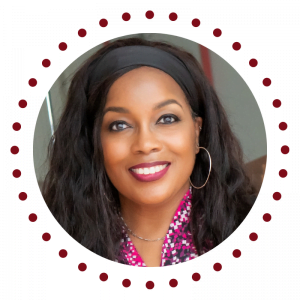
Want Karan to be Your Podcast Guest?
- Blended Workforces & the Gig Economy
- Critical Execution Tactics of High-performing Leaders
- Entrepreneurism & Leading Your Business
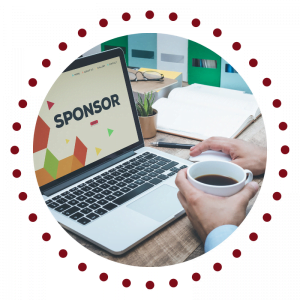
Want to be a Podcast Sponsor?
All sponsorships come with a featured spot on show notes pages.
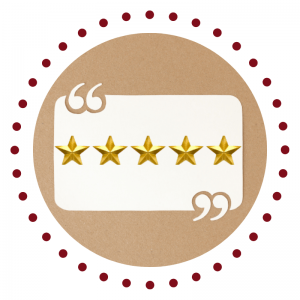
Like the Show? Please Leave a Review
If you like the show, it would mean the world to her if you left a quick review.
Your word is golden, so a HUGE thank you in advance!

#KeepInTouch
via our podcast alerts
Subscribe now to discover why thousands of monthly listeners who are passionate about doing their best work prioritize time each week to listen to the Blended Workforces @Work podcast.
#AboutSDL
#WhereToFindUs
MAILING
4480-H South Cobb Drive
PMB 219
Smyrna, GA 30080
PHYSICAL
2121 NewMarket Parkway
Ste. 108
Marietta, GA 30067
#ContactOptions
Customer Service Email:
service@shockinglydifferent.com
Call or Text:
770-384-1103
#Office Hours
MON-FRI
8:30 AM – 6:30 PM
Weekends By Appointment

